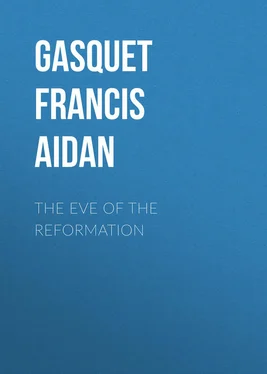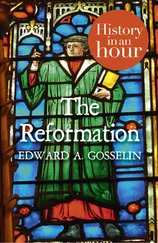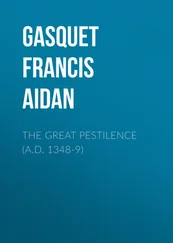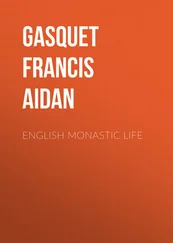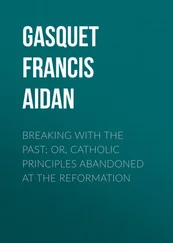Francis Gasquet - The Eve of the Reformation
Здесь есть возможность читать онлайн «Francis Gasquet - The Eve of the Reformation» — ознакомительный отрывок электронной книги совершенно бесплатно, а после прочтения отрывка купить полную версию. В некоторых случаях можно слушать аудио, скачать через торрент в формате fb2 и присутствует краткое содержание. Жанр: foreign_antique, foreign_prose, на английском языке. Описание произведения, (предисловие) а так же отзывы посетителей доступны на портале библиотеки ЛибКат.
- Название:The Eve of the Reformation
- Автор:
- Жанр:
- Год:неизвестен
- ISBN:нет данных
- Рейтинг книги:3 / 5. Голосов: 1
-
Избранное:Добавить в избранное
- Отзывы:
-
Ваша оценка:
- 60
- 1
- 2
- 3
- 4
- 5
The Eve of the Reformation: краткое содержание, описание и аннотация
Предлагаем к чтению аннотацию, описание, краткое содержание или предисловие (зависит от того, что написал сам автор книги «The Eve of the Reformation»). Если вы не нашли необходимую информацию о книге — напишите в комментариях, мы постараемся отыскать её.
The Eve of the Reformation — читать онлайн ознакомительный отрывок
Ниже представлен текст книги, разбитый по страницам. Система сохранения места последней прочитанной страницы, позволяет с удобством читать онлайн бесплатно книгу «The Eve of the Reformation», без необходимости каждый раз заново искать на чём Вы остановились. Поставьте закладку, и сможете в любой момент перейти на страницу, на которой закончили чтение.
Интервал:
Закладка:
We are not here concerned with another and more delicate question as to the papal prerogatives exercised in England. For clearness’ sake in estimating the forces which made for change on the eve of the Reformation, this subject must be examined in connection with the whole attitude of England to Rome and the Pope in the sixteenth century. It must, consequently, be understood that in trying here to illustrate the attitude of men’s minds at this period to these important and practical questions, a further point as to the claims of the Roman Pontiffs in regard to some or all of them has yet to be considered. Even in examining the questions at issue between the authorities – lay and ecclesiastical – in the country, the present purpose is to record rather than to criticise, to set forth the attitude of mind as it appears in the literature of the period, rather than to weigh the reasons and judge between the contending parties.
The lawyer, Christopher Saint-German, is a contemporary writer to whom we naturally turn for information upon the points at issue. He, of course, takes the layman’s side as to the right of the State to interfere in all, or in most, questions which arise as to the dues of clerics, and other temporalities, such as tithes, &c., which are attached to the spiritual functions of the clergy. Moreover, beyond claiming the right for the State so to interfere in the regulation of all temporalities and kindred matters, Saint-German also held that in some things in which custom had given sanction to the then practice, it would be for the good of the State that it should do so. In his Dyalogue between a Student of Law and a Doctor of Divinity , 68 68 Saint-German was born 1460. He was employed by Thomas Cromwell on some business of the State, and died in 1540. The Dyalogue was printed apparently first in Latin, but subsequently in English. It consisted of three parts (1) published by Robert Wyer, (2) by Peter Treveris, 1531, and (3) by Thomas Berthalet, also in 1531.
his views are put clearly; whilst the Doctor states, though somewhat lamely perhaps, the position of the clergy.
To take the example of “mortuaries,” upon which the Parliament had already legislated to the dismay of some of the ecclesiastical party, who, as it appears, on the plea that the law was unjust and beyond the competence of the State authority, tried in various ways to evade the provisions of the Act, which was intended to relieve the laity of exactions that, as they very generally believed, had grown into an abuse. Christopher Saint-German holds that Parliament was quite within its rights. The State could, and on occasion should, legislate as to dues payable to the clergy, and settle whether ecclesiastics, who claim articles in kind, or sums of money by prescriptive right, ought in fact to be allowed them. There is, he admits, a difficulty; he does not think that it would be competent for the State to prohibit specific gifts to God’s service, or to say that only “so many tapers shall be used at a funeral,” or that only so many priests may be bidden to the burial, or that only so much may be given in alms. In matters of this kind he does not think the State has jurisdiction to interfere. “But it has,” he says, “the plain right to make a law, that there shall not be given above so many black gowns, or that there shall be no herald of arms” present, unless it is the funeral of one “of such a degree,” or that “no black cloths should be hung in the streets from the house where the person died, to the church, as is used in many cities and good towns, or the prohibition of such other things as are but worldly pomps, and are rather consolations to the friends that are alive, than any relief to the departed soul.” In these and such like things, he says: “I think the Parliament has authority to pass laws, so as to protect the executors of wills, and relieve them from the necessity of spending so much of the inheritance of the deceased man’s heirs.” 69 69 Dyalogue , ut sup. , 3rd part, f. 2.
In like manner the lawyer holds that in all strictly temporal matters, whatever privilege and exemption the State may allow and has allowed the clergy, it still possesses the radical power to legislate where and when it sees fit. It does not in fact by lapse of time lose the ordinary authority it possesses over all subjects of the realm in these matters. Thus, for example, he holds that the State can and should prohibit all lands in mortmain passing to the Church; and that, should it appear to be a matter of public policy, Parliament might prohibit and indeed break the appropriations of benefices already made to monasteries, cathedrals, and colleges, and order that they should return to their original purposes. “The advowson,” he says, “is a temporal inheritance, and as such is under the Parliament to order it as it sees cause.” This principle, he points out, had been practically admitted when the Parliament, in the fourth year of Henry IV., cancelled all appropriations of vicarages which had been made from the beginning of Richard II.’s reign. It is indeed “good,” he adds, “that the authority of the Parliament in this should be known, and that it should cause them to observe such statutes as are already made, and to distribute some part of the fruits (of the benefices) among poor parishioners according to the statute of the twentieth year of King Richard II.”
In the same way, and for similar reasons, Saint-German claims that the State has full power to determine questions of “Sanctuary,” and to legislate as to “benefit of clergy.” Such matters were, he contends, only customs of the realm, and in no sense any point of purely spiritual prerogative. Like every other custom of the realm, these were subject to revision by the supreme secular authority. “The Pope by himself,” he adds, “cannot make any Sanctuary in this realm.” This question of “Sanctuary” rights was continually causing difficulties between the lay and the ecclesiastical authorities. To the legal mind the custom was certainly dangerous to the well-being of the State, and made the administration of justice unnecessarily complicated, especially when ecclesiastics pleaded their privileges, and strongly resisted any attempt on the part of legal officials to ignore them. Cases were by no means infrequent in the courts in the reigns of Henry VII. and Henry VIII., which caused more or less friction between the upholders of the two views. 70 70 One of the first Acts of King Henry VII. on his accession, was to obtain from the Pope a Bull agreeing to some changes in the Sanctuary customs. Prior Selling of Canterbury was despatched as King’s Orator to Rome with others to Pope Innocent VIII. in 1487, and brought back the Pope’s approval of three points in which the king proposed to change these laws. First , that if any person in Sanctuary went out at night and committed mischief and trespass, and then got back again, he should forfeit his privilege of Sanctuary. Secondly , that though the person of a debtor might be protected in Sanctuary, yet his goods out of the precincts were not so protected from his creditors. Thirdly , that where a person took Sanctuary for treason, the king might appoint him keepers within the Sanctuary.
To illustrate the state of conflict on this, in itself a very minor matter, a trial which took place in London in the year 1519 is here given in some detail. One John Savage in that year was charged with murder. At the time of his arrest he was living in St. John Street (Clerkenwell), and when brought to trial pleaded that he had been wrongfully arrested in a place of Sanctuary belonging to the Priory of St. John of Jerusalem. To justify his contention and obtain his liberty, he called on the Prior of the Knights of St. John to maintain his rights and privileges, and vindicate this claim of Sanctuary. The prior appeared and produced the grant of Pope Urban III., made by Bull dated in 1213, which had been ratified by King Henry III. He also cited cases in which he alleged that in the reign of the late King Henry VII. felons, who had been seized within the precincts, had been restored to Sanctuary, and he therefore argued that this case was an infringement of the rights of his priory.
Интервал:
Закладка:
Похожие книги на «The Eve of the Reformation»
Представляем Вашему вниманию похожие книги на «The Eve of the Reformation» списком для выбора. Мы отобрали схожую по названию и смыслу литературу в надежде предоставить читателям больше вариантов отыскать новые, интересные, ещё непрочитанные произведения.
Обсуждение, отзывы о книге «The Eve of the Reformation» и просто собственные мнения читателей. Оставьте ваши комментарии, напишите, что Вы думаете о произведении, его смысле или главных героях. Укажите что конкретно понравилось, а что нет, и почему Вы так считаете.
